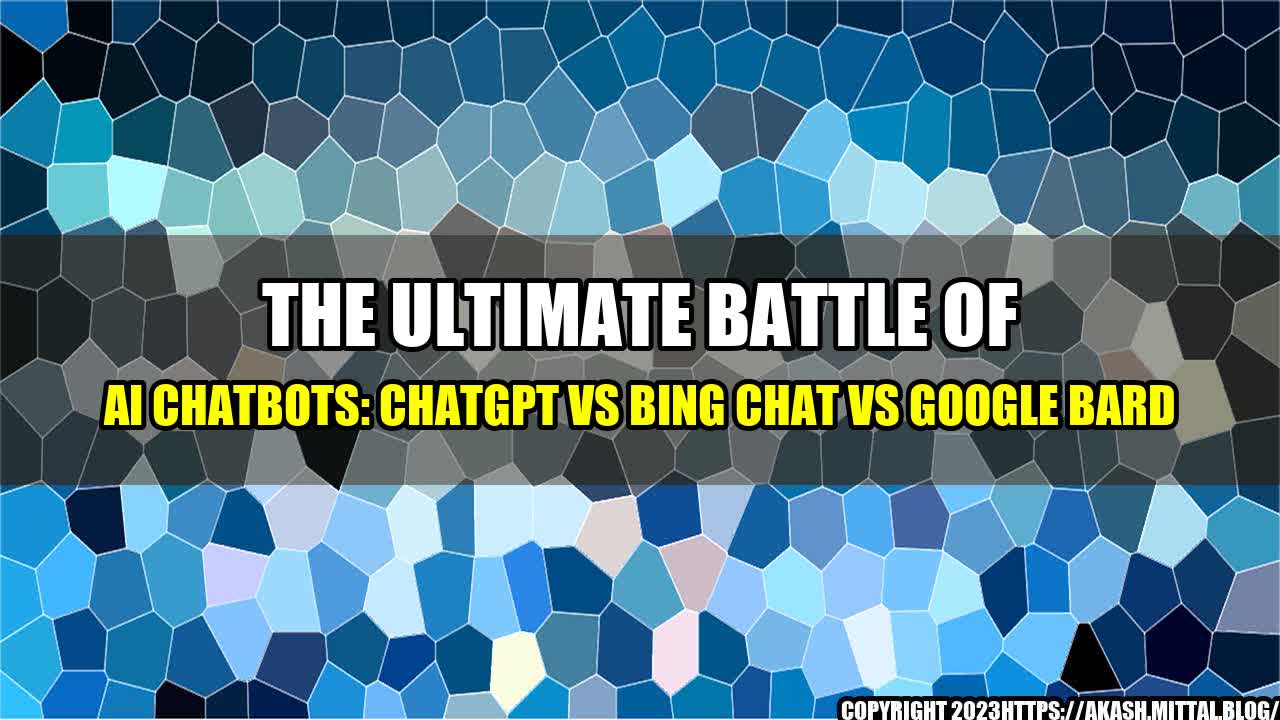A Puzzling Encounter with an AI Chatbot
It was a typical afternoon at the office and I was bored to death. Suddenly, a notification popped up on my screen. It was a message from a chatbot I've never seen before. "Hi there, I'm GPT-3, a state-of-the-art AI language model. Want to chat?"
Curious but skeptical, I decided to give it a try. I typed in a simple question: "What's the weather like today?" Within seconds, the chatbot replied with accurate and detailed information, including the temperature, humidity, and wind speed. I was impressed.
But then, I threw in a curveball: "Can you recommend a good restaurant nearby?" The chatbot seemed to struggle, offering generic responses that didn't really answer my question. I realized that, despite its impressive capabilities, this AI chatbot still had a long way to go before it could match the human touch.
ChatGPT vs Bing Chat vs Google Bard: The Showdown
In today's digital age, AI chatbots have become ubiquitous, offering businesses and consumers alike a range of benefits, from 24/7 customer service to automated sales support. But with so many options out there, how do you choose the right chatbot for your needs?
We've pitted three of the most popular AI chatbots against each other to help you decide: ChatGPT, Bing Chat, and Google Bard.
Round 1: Language Understanding
ChatGPT, powered by OpenAI's GPT-3 language model, has revolutionized natural language processing, enabling it to understand and respond to even complex queries with reasonable accuracy. Bing Chat, a Microsoft product, also boasts strong language understanding, thanks to its use of machine learning algorithms. Google Bard, on the other hand, is still in its early development stage and struggles with more nuanced language.
Round 2: Conversational Skills
When it comes to conversational skills, ChatGPT holds a clear advantage, thanks to its ability to generate human-like responses that incorporate context and tone. Bing Chat offers decent conversational skills, but its dialogues tend to be more stilted and robotic. Google Bard, again, lags behind due to its limited conversational database.
Round 3: Integration and Customization
Both ChatGPT and Bing Chat offer seamless integration with various platforms (e.g. Facebook Messenger, Slack, etc.) and allow for a high degree of customization, including the addition of personalized branding and voice commands. Google Bard is still a bit behind in this regard, as it has yet to launch any integrations or customization features.
So, who emerges victorious in this AI chatbot showdown? It depends on your specific needs and use cases. ChatGPT is ideal for complex tasks that require a high level of accuracy and nuance (e.g. virtual tutoring, legal assistance, etc.). Bing Chat is a solid choice for providing basic customer service and FAQ responses. Google Bard, while still in its early stages, shows promise for casual chat conversations and entertainment purposes.
: How AI Chatbots are Transforming Industries
Let's take a closer look at some real-world examples of how AI chatbots are revolutionizing various industries:
Healthcare: Babylon Health
Babylon Health, a UK-based healthcare provider, uses a chatbot powered by artificial intelligence to provide remote consultations and diagnoses. Patients can describe their symptoms to the chatbot, which uses machine learning algorithms to analyze the responses and provide a recommended course of action. This has helped to improve access to healthcare services, especially in rural and underserved areas.
E-commerce: H&M
H&M, the popular fashion retailer, uses an AI chatbot named Kikobot to provide personalized style recommendations to customers. The chatbot asks a series of questions about the customer's preferences, body shape, and budget, and then generates outfit options based on the responses. This has resulted in increased sales and customer satisfaction.
Education: Duolingo
Duolingo, the language-learning app, uses an AI chatbot to help users practice their conversational skills. The chatbot asks users to respond to various prompts in the target language, providing instant feedback and corrections. This has helped users to improve their language proficiency and confidence.
When implementing an AI chatbot in your own industry, keep these practical tips in mind:
- Clarify your goals and objectives before choosing a chatbot platform
- Ensure your chatbot is easily accessible and intuitive to use
- Continuously train and refine your chatbot's algorithms to improve its performance
The Future of AI Chatbots
The potential of AI chatbots is vast and exciting. Here are three key takeaways:
- AI chatbots are becoming increasingly sophisticated, with machine learning algorithms and natural language processing enabling more nuanced and accurate responses.
- AI chatbots have the potential to revolutionize various industries by offering personalized and efficient services to customers.
- As AI chatbots become more prevalent, it is important to ensure that ethical considerations and data privacy are prioritized.

Curated by Team Akash.Mittal.Blog
Share on Twitter Share on LinkedIn